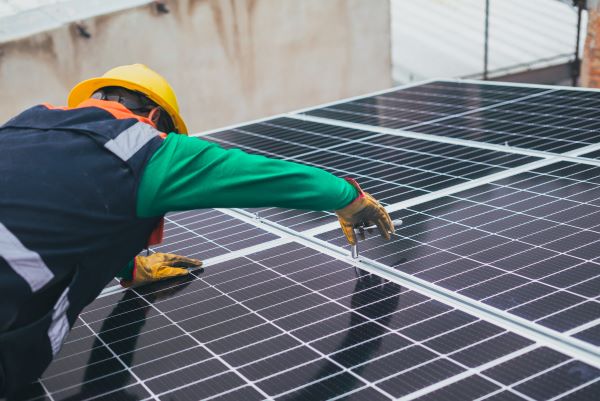
Strategies to Overcome Recruitment Challenges in Renewable Energy
13 Sep, 20235
Contents
- Understanding the Intersection of Renewable Energy and Cybersecurity
- The Importance of Cybersecurity in Renewable Energy
- The Role of Cybersecurity in Solar and Wind Energy
- In-Demand Cybersecurity Roles in the Renewable Energy Sector
- Cybersecurity Analysts in Renewable Energy
- Cybersecurity Engineers in Solar Energy
- Cybersecurity Consultants for Wind Energy
- The Future of Cybersecurity in Renewable Energy
- Emerging Cybersecurity Roles in Renewable Energy
- The Impact of Technological Advancements on Cybersecurity Roles
- The Role of AI and Machine Learning in Renewable Energy Cybersecurity
- Challenges and Opportunities in Renewable Energy Cybersecurity
- Addressing Cybersecurity Threats in Renewable Energy
- Opportunities for Cybersecurity Professionals in Renewable Energy
- The Role of Government and Policy in Renewable Energy Cybersecurity
Renewable energy has become a key focus in today's world as we strive to reduce our carbon footprint and mitigate the effects of climate change. Solar and wind energy are two of the most widely adopted forms of renewable energy, and they play a crucial role in our transition to a sustainable future. However, with the growing reliance on these technologies, there is an increasing need to address the cybersecurity risks associated with them. In this article, we will explore the intersection of renewable energy and cybersecurity and delve into the most in-demand cybersecurity roles in the industry.
Understanding the Intersection of Renewable Energy and Cybersecurity
The Importance of Cybersecurity in Renewable Energy
Renewable energy systems, just like any other technological infrastructure, are susceptible to cyber threats. As solar and wind energy technologies become more interconnected and integrated into the electricity grid, their vulnerabilities to cyberattacks increase. A breach in the cybersecurity of these systems can have severe consequences, ranging from disrupting power supply to compromising the safety of critical infrastructure.
With the global shift towards renewable energy sources, it is crucial to recognize the significance of cybersecurity in ensuring the smooth and secure operation of these systems. The reliance on solar and wind energy is growing rapidly, making it imperative to address the potential risks associated with cyber threats.
The Role of Cybersecurity in Solar and Wind Energy
Cybersecurity plays a vital role in ensuring the reliable operation and protection of solar and wind energy systems. It involves implementing measures to safeguard against unauthorized access, data breaches, and system disruptions. By proactively addressing cybersecurity risks, renewable energy stakeholders can maintain the integrity, availability, and confidentiality of their systems.
One of the key aspects of cybersecurity in renewable energy is the protection of data. Solar and wind energy systems generate vast amounts of data that need to be securely stored and transmitted. This data includes information about energy production, consumption patterns, and system performance. Ensuring the confidentiality of this data is crucial to prevent unauthorized access and potential manipulation.
In addition to data protection, cybersecurity measures also focus on securing the physical infrastructure of renewable energy systems. This includes protecting control systems, communication networks, and monitoring devices from potential cyber threats. By implementing robust security protocols, renewable energy stakeholders can prevent unauthorized access and mitigate the risk of system disruptions.
Another important aspect of cybersecurity in renewable energy is the detection and response to cyber incidents. Continuous monitoring and analysis of system behavior can help identify any suspicious activities or anomalies that may indicate a cyberattack. By promptly detecting and responding to these incidents, renewable energy stakeholders can minimize the potential damage and ensure the uninterrupted operation of their systems.
Furthermore, cybersecurity in renewable energy extends beyond the individual systems to the larger energy grid. As renewable energy technologies become more integrated into the existing infrastructure, it is crucial to address the potential vulnerabilities that may arise. This requires collaboration and coordination among various stakeholders, including energy providers, system operators, and cybersecurity experts, to develop comprehensive strategies for protecting the entire energy ecosystem.
The intersection of renewable energy and cybersecurity is of utmost importance in today's digital age. As the world increasingly relies on solar and wind energy, it is crucial to recognize and address the potential risks associated with cyber threats. By implementing robust cybersecurity measures, renewable energy stakeholders can ensure the reliable and secure operation of their systems, contributing to a sustainable and resilient energy future.
In-Demand Cybersecurity Roles in the Renewable Energy Sector
Cybersecurity Analysts in Renewable Energy
Cybersecurity analysts are responsible for monitoring and analyzing potential threats to renewable energy systems. They assess vulnerabilities, develop incident response plans, and implement security protocols to protect against cyber threats. These professionals play a crucial role in identifying and mitigating risks, ensuring the continuous and secure operation of renewable energy infrastructure.
With the increasing adoption of renewable energy sources, such as solar and wind, the demand for cybersecurity analysts in the renewable energy sector is on the rise. These experts are at the forefront of safeguarding critical infrastructure from cyber attacks, ensuring the stability and reliability of renewable energy systems.
One of the key responsibilities of cybersecurity analysts in the renewable energy sector is to stay updated with the latest cyber threats and vulnerabilities specific to the industry. They continuously monitor and analyze emerging risks and develop proactive strategies to prevent potential attacks. By staying ahead of the curve, these professionals help renewable energy companies maintain a strong defense against cyber threats.
Cybersecurity Engineers in Solar Energy
Cybersecurity engineers specialize in designing and implementing secure solar energy systems. They work closely with solar energy developers and installers to integrate cybersecurity measures into the hardware and software components of solar installations. Their expertise ensures that solar energy systems are resilient against cyber threats and can operate securely in an increasingly interconnected energy landscape.
The role of cybersecurity engineers in solar energy goes beyond securing individual solar installations. They also contribute to the development of secure communication protocols and data encryption methods that protect the transmission of energy data between solar installations and grid operators. By implementing robust cybersecurity measures, these engineers help maintain the integrity and confidentiality of sensitive energy data.
As solar energy becomes more integrated into smart grids and interconnected energy networks, the need for cybersecurity engineers with expertise in solar energy systems is paramount. These professionals are instrumental in ensuring the secure and reliable operation of solar energy infrastructure, safeguarding against potential cyber attacks that could disrupt energy supply and compromise the stability of the grid.
Cybersecurity Consultants for Wind Energy
Cybersecurity consultants offer their expertise to wind energy companies, providing guidance on best practices, risk assessments, and compliance with cybersecurity standards. With the rapid growth and complexity of wind energy projects, these professionals help organizations identify and address vulnerabilities in their systems, enabling them to establish robust cybersecurity frameworks.
Wind energy projects often involve a multitude of interconnected systems, including turbines, control systems, and communication networks. This complexity presents unique challenges in terms of cybersecurity, as each component must be protected against potential threats. Cybersecurity consultants in the wind energy sector work closely with project teams to assess the security posture of these systems and develop comprehensive strategies to mitigate risks.
Additionally, cybersecurity consultants play a vital role in ensuring compliance with industry-specific cybersecurity standards and regulations. They help wind energy companies navigate the complex landscape of cybersecurity requirements, ensuring that their systems meet the necessary criteria to operate securely and protect sensitive data.
The renewable energy sector is not immune to cyber threats, and the demand for cybersecurity professionals in this industry is growing rapidly. Cybersecurity analysts, engineers, and consultants play critical roles in safeguarding renewable energy infrastructure, ensuring the secure and reliable operation of solar and wind energy systems. By continuously monitoring and addressing potential vulnerabilities, these professionals contribute to the growth and sustainability of the renewable energy sector in an increasingly digital world.
The Future of Cybersecurity in Renewable Energy
Emerging Cybersecurity Roles in Renewable Energy
As the renewable energy sector continues to evolve, new cybersecurity roles are emerging to address the ever-changing threat landscape. These roles include cybersecurity incident response specialists, who respond to and mitigate cyber incidents in real-time, and cybersecurity architects, who design secure and scalable infrastructures for renewable energy projects.
With the increasing reliance on renewable energy sources, the need for robust cybersecurity measures has become paramount. As more renewable energy systems are connected to the internet, they become potential targets for cyberattacks. This has led to the rise of cybersecurity incident response specialists, who are trained to handle and neutralize cyber threats as they occur. These specialists work tirelessly to ensure the uninterrupted operation of renewable energy systems, safeguarding them from potential disruptions caused by malicious actors.
Furthermore, the role of cybersecurity architects has become crucial in the renewable energy sector. These professionals are responsible for designing secure and scalable infrastructures that can withstand cyberattacks. They work closely with renewable energy project teams to identify potential vulnerabilities and implement effective security measures. By integrating cybersecurity into the design phase of renewable energy projects, these architects play a vital role in preventing cyber threats from compromising the integrity and reliability of the energy systems.
The Impact of Technological Advancements on Cybersecurity Roles
Technological advancements such as the Internet of Things (IoT) and cloud computing are revolutionizing the renewable energy sector. The IoT allows for the interconnection of various devices and systems, enabling real-time monitoring and control of renewable energy systems. Cloud computing, on the other hand, provides scalable storage and processing capabilities, facilitating the efficient management of vast amounts of data generated by renewable energy systems.
While these advancements bring numerous benefits to the renewable energy sector, they also introduce new cybersecurity challenges. The interconnected nature of IoT devices increases the attack surface for potential cyber threats. Additionally, the reliance on cloud computing raises concerns about data privacy and security. As a result, cybersecurity professionals will need to stay abreast of these advancements to develop innovative solutions that protect energy systems from emerging threats.
One of the key challenges in securing renewable energy systems is the sheer volume of data generated by IoT devices and stored in the cloud. This data includes information about energy production, consumption patterns, and system performance. To effectively analyze and protect this data, cybersecurity professionals are turning to artificial intelligence (AI) and machine learning.
The Role of AI and Machine Learning in Renewable Energy Cybersecurity
Artificial intelligence and machine learning have the potential to revolutionize renewable energy cybersecurity. These technologies can analyze vast amounts of data, identify patterns, and detect anomalies that may indicate a cyber threat. By leveraging AI and machine learning algorithms, cybersecurity professionals can develop proactive measures to prevent cyberattacks and respond swiftly to any potential breaches.
For example, AI-powered systems can continuously monitor renewable energy systems, analyzing data in real-time to detect any unusual activities or deviations from normal behavior. These systems can automatically trigger alerts and take preventive actions to mitigate potential cyber threats. By leveraging the power of AI and machine learning, cybersecurity measures in the renewable energy sector can be enhanced in terms of efficiency and effectiveness.
Furthermore, AI and machine learning can assist in the development of predictive models that anticipate cyber threats based on historical data. By analyzing patterns and trends, these models can provide valuable insights into potential vulnerabilities and help cybersecurity professionals proactively address them.
As the renewable energy sector continues to grow and evolve, so does the need for robust cybersecurity measures. The emergence of new cybersecurity roles, the impact of technological advancements, and the potential of AI and machine learning all contribute to shaping the future of cybersecurity in renewable energy. By staying ahead of the ever-changing threat landscape and leveraging innovative technologies, cybersecurity professionals can ensure the resilience and security of renewable energy systems.
Challenges and Opportunities in Renewable Energy Cybersecurity
Addressing Cybersecurity Threats in Renewable Energy
Cybersecurity threats in renewable energy are dynamic and constantly evolving. It is essential for stakeholders to continuously adapt their security measures to counter these threats effectively. Regular risk assessments, employee training, and collaboration with cybersecurity experts are among the strategies that can help organizations address and mitigate potential risks.
Opportunities for Cybersecurity Professionals in Renewable Energy
The increasing demand for renewable energy cybersecurity expertise presents numerous opportunities for professionals in the field. As more organizations realize the critical importance of protecting their renewable energy infrastructure, there is a growing need for skilled cybersecurity professionals who can secure these systems and safeguard against cyber threats.
The Role of Government and Policy in Renewable Energy Cybersecurity
Government and policy play a vital role in shaping cybersecurity practices in the renewable energy sector. Establishing cybersecurity standards, regulations, and incentives can foster a culture of security and ensure that renewable energy projects adhere to best practices. Government agencies can also collaborate with industry stakeholders to share threat intelligence and develop proactive cybersecurity strategies.
As the renewable energy sector continues its rapid growth and evolution, the integration of cybersecurity measures becomes paramount in safeguarding the reliability and resilience of solar and wind energy systems. To address the unique challenges of this dynamic industry, diverse cybersecurity roles are emerging. If you're an organization committed to securing your renewable energy infrastructure and contributing to the sustainable transformation of the global energy landscape, it's time to invest in cybersecurity professionals. Contact us today to explore how we can assist you in building a robust cybersecurity team to ensure uninterrupted energy supply and future-proof your operations.


